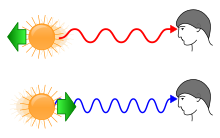Chemical Sciences: A Manual for CSIR-UGC National Eligibility Test for Lectureship and JRF/Blue shift
| This page was imported and needs to be de-wikified. Books should use wikilinks rather sparsely, and only to reference technical or esoteric terms that are critical to understanding the content. Most if not all wikilinks should simply be removed. Please remove {{dewikify}} after the page is dewikified. |

Blue shift is the shortening of a transmitted signal's wavelength, and/or an increase in its frequency, due to the relativistic Doppler effect, which indicates that the object is moving toward the observer. The name comes from the fact that the shorter-wavelength end of the optical spectrum is the blue (or violet) end, hence, when visible light is compacted in wavelength, it is shifted towards the "blue" end of the spectrum. Since the longer-wavelength end of the visible electromagnetic spectrum is red, the opposite effect, of a lengthening of a signal's wavelength, is referred to as redshifting.
While the terms "redshifting" and "blueshifting" imply significantly redder or bluer light, only the most distant galaxies and those moving at speeds far above average emit light that arrives with perceptible red or blue tinges. For the most part, shifting is not a visible phenomenon.[1]
These terms and conventions ("blue" = compaction, "red"= diffusing) are used even when referring to signals outside the optical range (for instance, radio waves, x-rays and gamma rays).
Astronomy
[edit | edit source]Redshift is much more noted due to its importance to modern astronomy. While the general redshift of starlight is seen as evidence for an expanding universe, there are a few examples of blue shift in astronomy:
- The Andromeda Galaxy is moving towards our own Milky Way Galaxy within the Local Group; thus, when observed from earth, its light is undergoing a blue shift.
- When observing spiral galaxies, the side spinning towards us will have a slight blue shift (see Tully-Fisher relation).
- Also, Blazars are known to propel relativistic jets towards us, emitting synchrotron radiation and Bremsstrahlung that appears blue shifted.
- Nearby stars such as Barnard's Star are moving towards us, resulting in a very small blue shift.
Cause of blueshift in astronomy
[edit | edit source]These are the known possible causes of blue shift in astronomy:
- Movement of the source towards us, as seen in
- the edge of a rotating galaxy moving towards us
- In blazars which propel relativistic jets towards us
- Some galaxies [1] and quasars [2]
- Gravitational effects. See gravitational redshift
Notes
[edit | edit source]- ↑ Kuhn, Karl F. (2004). In Quest of the Universe. Jones & Bartlett Publishers. pp. 122–3. ISBN 0763708100.
{{cite book}}: Unknown parameter|coauthors=ignored (|author=suggested) (help)